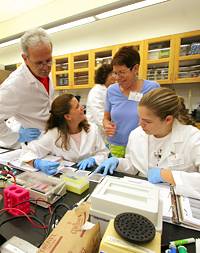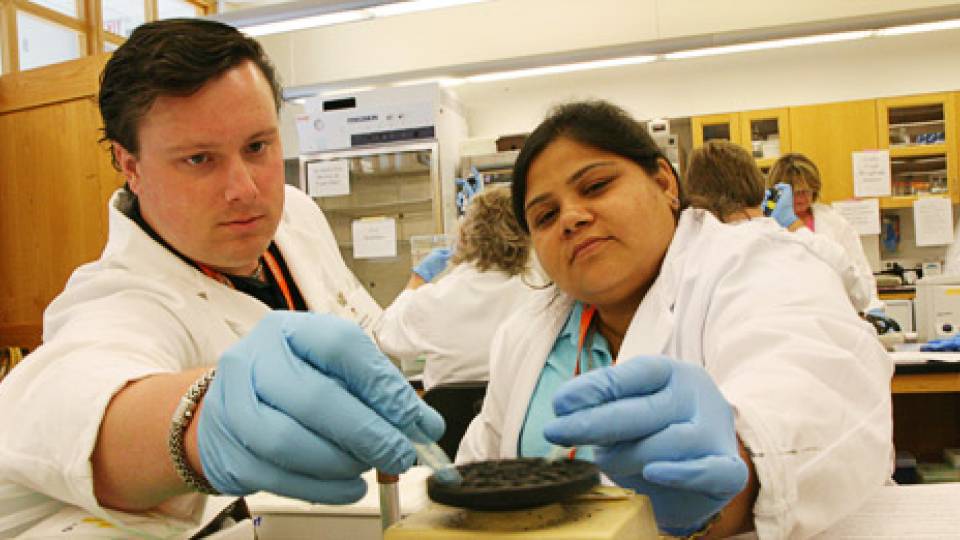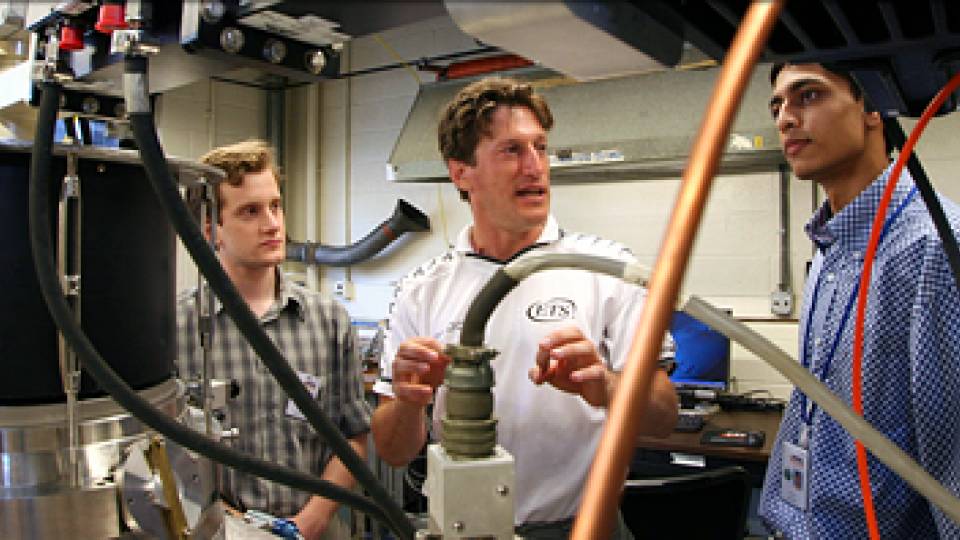Wearing identical white lab coats, 20 high-school teachers huddled
around bluish gels they just had subjected to electrophoresis, a
process that enabled them to visualize and study DNA fragments. For two
weeks every summer, teachers become students again in a
Princeton workshop that helps spread enthusiasm for science.
The workshop, "Molecular Biology in the 21st Century: Applications and
Dilemmas," is a hands-on laboratory-and-seminar course in which science
teachers learn basic molecular biology and come to understand
how genetic engineering has altered biology and affected medicine, law,
agriculture and everyday life. They then use their new skills and
knowledge to perform two independent projects, using state-of-the-art
techniques to search for genetic modifications in snack foods and to
identify numerous microbes present in soil. The workshop runs through
Friday, July 22.
The teachers believe the workshop helps them better serve their
students. "I now have a more thorough understanding of the material I'm
trying to relate to my students," said Chris James, who teaches at
Delaware Valley Regional High School in Frenchtown, N.J., and who spent
a recent day with other participants performing experiments they will
use in classrooms next year. "I can now say, 'I've done this. I know
what happens.'"
The work for these teachers will not end when the workshop does. "They
will need to be both dynamic and intellectually curious to take the
experiments they're doing here and revise them into a format suitable
for their classes," said Karen Malatesta, lab director of the workshop
and senior lecturer in Princeton's molecular biology department. "Most
teachers don't have hours of class time to spend doing experiments. So
that means they need to be a little inventive."
Some workshop alumni prove to be more than a little inventive and go so
far as to create entirely new courses based on the summer curriculum,
Malatesta noted. She said many are inspired by the accelerated
workshop, where they learn several techniques of genetic manipulation,
such as DNA testing on a variety of cells, including their own. Gel
electrophoresis is one of the methods the teachers use to analyze their
experimental results.
The teachers are a diverse group. They come from as far away as
California and Minnesota, though most are from New Jersey, and they
teach the full range of sciences.
In addition to gaining insights into the newest techniques and
research, the teachers learn what is expected of freshmen at Princeton
-- enabling them to better prepare their own students for college,
Malatesta said. In turn, interacting with the teachers gives Malatesta
a sense of what students currently learn in high school, which often
influences how she teaches her own courses during the academic year.
The workshop's ultimate goal is to exert a long-lasting influence on
and through teachers. During the academic year, outreach coordinator
Ann Sliski outfits laboratory loaner kits and makes them available to
workshop alumni. Worth $10,000 to $15,000 each, the kits contain all
the equipment and supplies teachers need to perform sophisticated
laboratory experiments with their students. Malatesta estimates that,
if teachers use their loaner kits and newfound knowledge to improve
their courses, the summer workshop could expose more than 2,000
additional people to the latest developments in molecular biology by
spring 2006.
After completing the workshop, a few select teachers become master
teachers. They share their knowledge with science teachers who have not
attended the summer workshop by running one of five Molecular Biology
Satellite Learning Centers in New Jersey during the academic year.
The annual workshop, one of several outreach programs administered by
the molecular biology department, was started in 1991 by Edward Cox,
the Edwin Grant Conklin Professor of Biology at Princeton. The Howard
Hughes Medical Institute, based in Chevy Chase, Md., provides funding
for the summer workshop, the satellite learning centers and other
programs in the molecular biology department.


